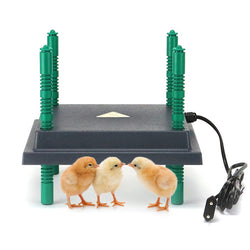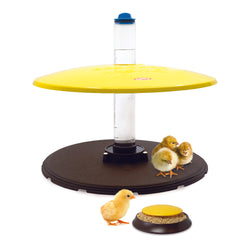Is wry neck a genetic weakness that I should be worried about seeing in my chickens' offspring?
Back to blog
If you have a hen with wry neck, it is probably not a genetic problem... but read on, because the problem with answering that question definitively is that "wry neck" is not in itself an illness. It's just a symptom. Torticollis is the medical/technical term for wry neck; it is an abnormal head position where the bird may not be able to hold her head in a normal position. "Wry neck," "crook neck," "twisted neck," "limber neck" and "stargazing" are all common, nontechnical terms that are used more or less interchangeably to describe the symptom of torticollis.

"My neck is fine, thank-you-very-much! It's my feathers that are askew!"
We recommend contacting a vet about your sick hen to get a firm diagnosis and treatment options. We are not veterinarians and can't diagnose your bird. A vet will be able to go farther than just telling you she has "wry neck." He or she will be able to examine your bird, perform some tests and find out what is causing the symptom, since it can be caused by so many different things!
Remember, torticollis is not an illness itself. Instead, it is a symptom that occurs in connection with many different illnesses and conditions. Among the illnesses that can cause the symptom of torticollis are Marek's disease (a virus), a deficiency in magnesium, a deficiency in vitamin E, a deficiency in thiamine (medicated chick feeds can interfere with thiamin uptake), avian encephalomyelitis (a virus), food poisoning (such as botulism), heavy metal/lead toxicity, encephalitic listeriosis (a virus), some presentations of aspergillosis (a fungal infection), otitis (ear infection), or even head injury.
Crested breeds like silkies are more likely to experience torticollis in connection with injury due to the shape of their skulls, so that would be an indirect genetic connection, in a sense... however, the direct cause of the problem would be injury. The "best" Silkies and crested breeds produced by breeders (but usually not hatcheries) have what is called a "vaulted" skull, and it leaves a sort of hole in the bones of the skull in places, like a fontanel that never closes. This vaulting makes the bird's crest bigger, but a bird with a vaulted skull can be more susceptible to head injury as a result. Even if your hen is not crested, and does not have a vaulted skull, injuries are still possible.
As you see, though, none of those conditions listed above is strictly genetic. Instead, they are environmental, often based on diet or on which communicable illnesses your birds are exposed to. There is at least one hereditary cause of torticullis; it could be caused by something called "congetital loco," in which the chicks hatch out with the inability to stand or balance. This problem is thought to be caused by a recessive gene causing a malformation of the ear structure, but more importantly, if this were the problem, it would be immediately apparent in the chicks, and would not develop later in a hen.
There are possibly more causes of torticollis, too--your vet will be able to give you a full list of possibilities. Remember, we are not veterinarians and we just don't have the medical expertise to diagnose your bird's condition. Please contact your vet to get a good diagnosis.

"My neck is fine, thank-you-very-much! It's my feathers that are askew!"
We recommend contacting a vet about your sick hen to get a firm diagnosis and treatment options. We are not veterinarians and can't diagnose your bird. A vet will be able to go farther than just telling you she has "wry neck." He or she will be able to examine your bird, perform some tests and find out what is causing the symptom, since it can be caused by so many different things!
Remember, torticollis is not an illness itself. Instead, it is a symptom that occurs in connection with many different illnesses and conditions. Among the illnesses that can cause the symptom of torticollis are Marek's disease (a virus), a deficiency in magnesium, a deficiency in vitamin E, a deficiency in thiamine (medicated chick feeds can interfere with thiamin uptake), avian encephalomyelitis (a virus), food poisoning (such as botulism), heavy metal/lead toxicity, encephalitic listeriosis (a virus), some presentations of aspergillosis (a fungal infection), otitis (ear infection), or even head injury.
Crested breeds like silkies are more likely to experience torticollis in connection with injury due to the shape of their skulls, so that would be an indirect genetic connection, in a sense... however, the direct cause of the problem would be injury. The "best" Silkies and crested breeds produced by breeders (but usually not hatcheries) have what is called a "vaulted" skull, and it leaves a sort of hole in the bones of the skull in places, like a fontanel that never closes. This vaulting makes the bird's crest bigger, but a bird with a vaulted skull can be more susceptible to head injury as a result. Even if your hen is not crested, and does not have a vaulted skull, injuries are still possible.
As you see, though, none of those conditions listed above is strictly genetic. Instead, they are environmental, often based on diet or on which communicable illnesses your birds are exposed to. There is at least one hereditary cause of torticullis; it could be caused by something called "congetital loco," in which the chicks hatch out with the inability to stand or balance. This problem is thought to be caused by a recessive gene causing a malformation of the ear structure, but more importantly, if this were the problem, it would be immediately apparent in the chicks, and would not develop later in a hen.
There are possibly more causes of torticollis, too--your vet will be able to give you a full list of possibilities. Remember, we are not veterinarians and we just don't have the medical expertise to diagnose your bird's condition. Please contact your vet to get a good diagnosis.



